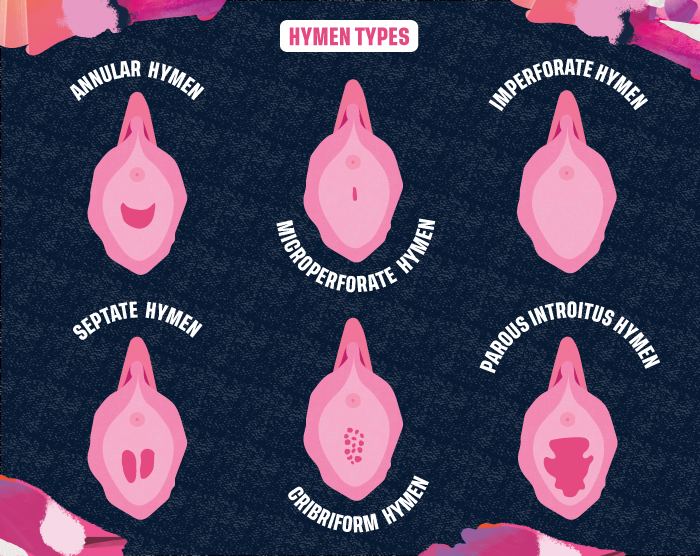Nov 03, 2022
What is a hymen?
The hymen. Such a tiny piece of tissue that somehow generates so many misunderstandings. If you’re anything like us, you’ve probably grown up hearing your fair share of myths about this membrane.
We’re setting the record straight on all things hymen related. What it is, where it is, how it breaks and everything we get wrong about ‘popping the cherry’. It’s time to talk about the hymen!
Where is the hymen located?
Your hymen is a thin tissue membrane that surrounds your vaginal opening (where blood leaves your body during menstruation). Typically, the hymen doesn’t actually cover the entrance of your vagina completely but is slightly open to allow blood or fluids to pass through. Think of it like a super elastic hair scrunchie that sits just inside your vagina.
What does a hymen look like?
Just like vulvas, all hymens are unique! Some people may have a ring-shaped hymen, while other hymens can be shaped like a half-moon. Your hymen might be thicker, thinner, bigger or smaller. Don’t worry if you think you have a ‘misshapen’ hymen — differences are normal. Some people are even born without a hymen!
What are the different hymen types?
While hymens come in all different sizes and shapes, certain types can cause a bit of trouble. It’s important to be aware of hymen conditions because you may need a minor procedure to put things right!

Annular hymens
Surround the whole vaginal opening, and crescent-shaped hymens, which only partially surround the vagina’s opening, are what we might consider ‘typical’ hymens.
Septate hymen
Occurs when an extra band of tissue forms around the hymen, meaning you have two small vaginal openings instead of one. Just like the other conditions, a septate hymen can be corrected through minor surgery.
Microperforate hymen
When the hymen has a smaller-than-average opening. It’s a tongue twister, but a microperforate hymen means you may find it difficult to insert tampons or have intercourse.
Cribiform hymens
The hymen has many small openings, just like a piece of tissue paper with small holes punched through it. Menstrual blood and secretions can normally pass through a cribiform hymen but, again, this can make inserting tampons or having sex a challenge.
Imperforate hymen
Essentially, the hymen does not have an opening and instead covers the whole vaginal opening. Meaning menstrual secretions are not able to pass through, and you might feel abdominal or pelvic pain as a result. An imperforate hymen can easily be corrected through a minor surgery
Parous introitus hymen
This is when the hymen is nearly or completely absent and typically occurs in those who have given birth vaginally.
While every hymen is different, most of the conditions described are rare, and you’ll usually notice if you have a hymen abnormality. Discomfort, pelvic pain, or trouble inserting a tampon can all be indications that there’s a hymen issue you need to address.
Remember that pain when inserting a tampon isn’t necessarily a sign of an abnormal hymen, it could be that the tampon isn’t being inserted properly, or you’re not using the right size tampon for your body and flow. For more info, check out our complete guide to tampons.
What is the purpose of the hymen?
Our bodies can be mysterious things, and the purpose of the hymen isn’t entirely clear… We know it doesn’t serve a biological function and it doesn’t help with reproduction, unlike our other internal genital organs. Some people believe its primary purpose is to protect the vagina from bacteria or foreign objects, but there’s not enough evidence to say for sure.
What happens when my hymen breaks?
Let’s set the record straight: our hymens stretch, they don’t break.
When we hear people talk about a ‘broken’ hymen, what they mean is that the hymen has stretched, thinned or torn – a bit like tissue paper! While hymenal tears can occur the first time they are penetrated, it’s more usual for your hymen to be naturally worn down over time. Because of this, you probably won’t feel any intense pain, and most people don’t notice at all.
Of course, we’re all different. For some people, the stretching or tearing of the hymen can hurt and there may be some light bleeding — just like the spotting you might get just before or after your period.
There are a ton of misconceptions about how the hymen ‘breaks’. ‘Popping the cherry’ is probably a term we’ve all heard, that’s used to express the breaking of the hymen after penetrative sex. The truth is, our hymen can be stretched in many different ways! Oral sex, penetration and masturbation can all stretch or tear the hymen, but so can riding a bike, climbing a tree or doing exercise!
How does my hymen change over time?
As we grow, get older and go through changes like puberty, pregnancy, childbirth, or menopause, our hymen will change. Before you hit puberty, your hymen is usually thinner and more sensitive. As you go through puberty and your body is hit with hormones (like oestrogen), your hymen grows and becomes more elastic. After a person reaches menopause and their oestrogen levels decrease, their hymen will change and become thinner once again!
What happens to the hymen during pregnancy and childbirth?
Pregnancy and childbirth also change the size and shape of the hymen. During pregnancy, the hymen becomes thicker as it fills with glycogen, which gives our bodies vital glucose during pregnancy. To prepare for childbirth, an increase in hormones causes the hymen to become stretchier. Vaginal childbirth can cause the hymen to tear, either as a result of stretching to allow for the baby to be delivered or from the doctor manually cutting the tissue to create a larger opening (aka an episiotomy). After childbirth, it’s not uncommon for the hymen to develop hymenal tags. This is extra tissue that protrudes from the hymen's edge. They usually don’t cause any health problems, but if you are experiencing any discomfort, it’s best to check in with your GP or healthcare provider as they may recommend removing them.
Does the hymen determine virginity?
An intact hymen is not a confirmation of a person’s virginity, just as a torn hymen is not a foolproof indication that a person is no longer a virgin. Our hymen won’t always break during penetrative sex, and may already be torn long before we become sexually active! Our hymen can also wear down during nonsexual forms of penetration, like inserting tampons, menstrual cups or getting a cervical screening test.
It’s time to dispel the myth that a broken hymen = a loss of virginity. First of all, Your virginity isn’t something that can be lost. When you have sex for the first time, you don’t ‘lose’ anything. Virginity is a cultural idea and is typically used to describe the status of not having had sexual intercourse.
If the idea of virginity is important to you, know that a broken hymen as a result of nonsexual penetration does not ‘take’ or ‘cancel’ your virginity. If you’ve not had sexual intercourse, then you’re a virgin. Simple!
Every hymen is unique
If you take anything away from this, let it be that your hymen is not a physical marker of virginity! Hymens will tear, stretch and change over time, for so many different reasons.
Every hymen is unique, so don’t worry if yours isn’t exactly quite like you expect. Get to know your body and if something doesn’t seem quite right down there, make sure to talk with your GP or medical professional.
Love, Libra x
Essity makes no warranties or representations regarding the completeness or accuracy of the information. This information should be used only as a guide and should not be relied upon as a substitute for professional, medical or other health professional advice.







